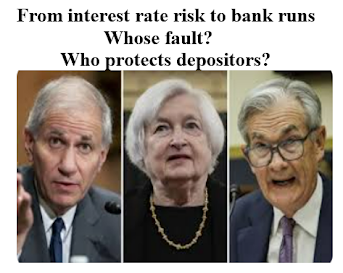Central bank Interest rate gamble - Stop it now or let a bank crunch?

In last four weeks, advanced market economies led by the US showed clear signs of a banking turmoil created by deposit outflows. Financial experts attribute this to heightened interest rate risk confronted by banks consequent to rapid phase of interest rate hikes by central banks. They also alert a possible trigger of banking and financial crisis after 2008/09. Therefore, they propose central banks to suspend rate hikes immediately and permit markets to stabilize gradually. Therefore, the objective of this short article is to present the phase of macroeconomic risks expected from present tight monetary policies and to alert policy authorities on the need for an alternative policy package to resolve such risks before they burst in the near future. Background of interest rates hikes The monetary policy story behind this is well articulated. Central banks commenced hiking interest rates beginning 2022 to tame rising inflation of four decades high. Present monetary policy models are dri


